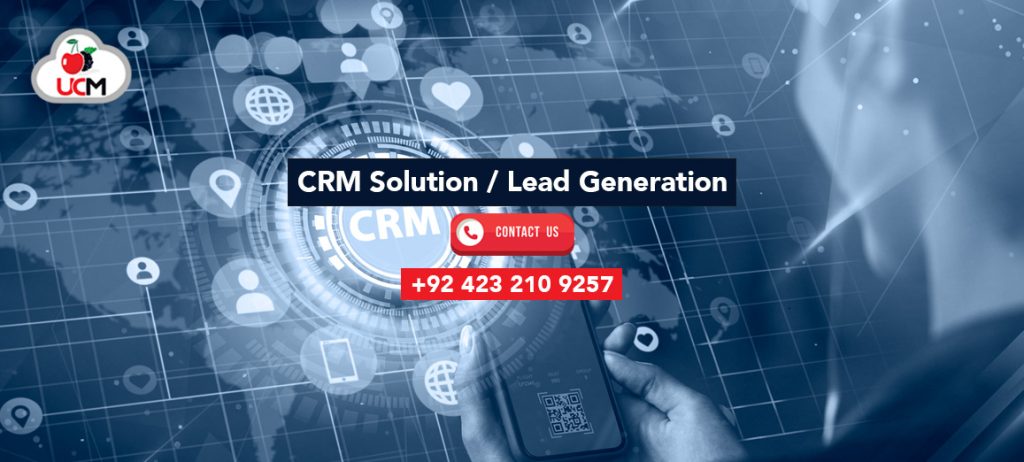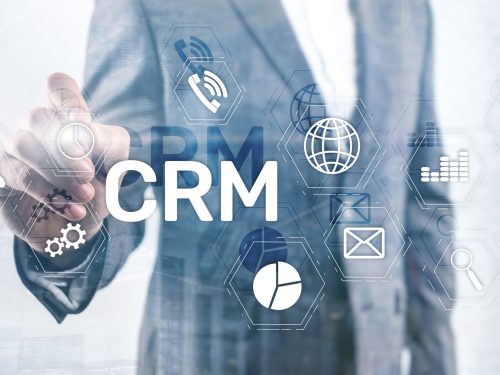Why Does Your Business Need CRM Solutions?
Today more than having a robust sales and marketing strategy is required to get success in a highly competitive digital industry. For instance, a deeper understanding of customer concerns and issues can help companies nurture fruitful relations by optimizing marketing efforts. CRM Solutions are ideal for streamlining your business connections, boosting customer happiness, and improving operational efficiency. Let’s delve deep into the potential of CRM software to revolutionize your business performance and captivating your current and potential clients like never before.
What are CRM Solutions?
These solutions benefit all sized companies and industries such as large enterprises, which can easily track customer activities and share them across all departments to strengthen customer relationships. CRM systems automate sales and marketing routine activities and increase the productivity of your sales, customer service, marketing, and IT teams. Companies can manage and organize all their business interactions with current and potential clients. This further helps them streamline all processes, including customer service interactions, sales calls, marketing emails, and more. Your teams can use customer data to understand trends and preferences and offer personalized services to keep them loyal.
Why is CRM Software Important for Companies?
1. It Organises Customer Data
Collecting and maintaining customer data manually is not an easy activity. A CRM system is a centralized database that collects and organizes data from different sources. This encompasses customer service, sales, and marketing processes. Companies can use these insights to understand purchasing patterns, consumer preferences, and communication hurdles.
2. It Allows Segmenting Customers
Sometimes, customer grouping makes it easy to interact with diverse audience needs. Advanced CRM software allows companies to categorize customers based on behavior, demographics, and buying habits. This further helps them provide specialized interactions and benefit from customized marketing strategies.
3. Promote Seamless Communication
If you are looking for resources to ensure constant communication with clients, AI-powered CRM Solutions can help. CRM systems enable companies to easily track past interactions, customer inquiries, feedback, and requests. Meanwhile, integrating social media, phone systems, email, and other communication platforms offers communication management from a single platform.
4. Automate Business Operations
Many repetitive tasks drain your team’s energy and time. However, incorporating CRM automates many sales and marketing tasks such as appointment scheduling, data entry, email sequence, and reminders. Your teams can focus on important tasks like developing strong connections and offering personalized services.
5. Customer-Centric Strategies
A customer relationship management system offers deep insights into customer needs, preferences, issues and behavior. You can analyze this data and insights to provide tailored products, run targeted marketing campaigns and offer personalized recommendations. By providing quick and affordable solutions to your customers, you can keep customers satisfied and nurture positive relationships.
Top Advantages of Using CRM Software For Your Business
1. Allow to Build Relationships with New Customers
Whenever a person subscribes to your brand newsletter, buys something using your online services, or clicks your advertisement, it provides valuable information about a new and targeted audience. Companies can collect all this data to make smart decisions regarding leads and prospects. New people automatically enter your CRM database when they sign up or buy your products. Teams can unlock the potential of social media advertising options by getting insights from this stored information to develop stronger relationships.
2. Strengthen Bonds with Existing Clients
According to recent research, reaching new clients can be more costly than maintaining the existing ones. Thus, instead of investing your energy and money in finding new customers, you should keep your existing customers engaged and satisfied. For instance, your teams can track which customers are interacting with your marketing campaigns and who needs reminders to return. The way companies can personalize marketing campaigns with CRM to let customers feel valued and active.
3. Understand Your Audience Completely
Whatever business you are running, a CRM system lets companies view all their contact information from a single dashboard. The system can help organize this data to take out the sense in it. They can segment data and make groups based on purchase history, preferences, age, and behavior. CRM systems offer you an aggregate view of audience data, enabling you to run targeted campaigns and ensure personalized interaction.
4. Appreciate Your Best Customers to Grow
You may be familiar with the Pareto Principle, which states that 80% of business revenue comes from 20% of customers. Although every customer is valued by a business, these 20% constitute your customer base by making purchases with consistency and suggesting your products to others. This is why people should develop stronger relationships with loyal customers. CRM software can help you identify your top customers and lead generators to reach them with better discounts and offers for ean nhanced customer experience.
5. Facilitate Tracking & Improving Marketing Performance
CRM systems organize and centralize all your business data so your sales and marketing teams can track customer needs. It is an ideal solution to keep all your teams on the same page about customer service. They can also identify customers who might need extra care to move forward. Moreover, companies can see whether their monitoring efforts are working properly or not otherwise, they can make adjustments to enhance efficiency. You can all do this with CRM and understand trends and patterns to develop more personalized strategies.
6. Automation Saves Time
Sometimes, companies need more time to manage everything on their to-do list, particularly in the sales process. Thankfully, CRM systems make it easy to organize all your business data in one place. You don’t waste valuable time switching between different apps and multiple datasets. Additionally, the system automates routine activities, ensuring that the right message is conveyed to the right person at the right time.
7. Provide Useful Insights to Understand Your Business Needs Better
An efficient CRM System Services Provider organizes your business data, saves time, and streamlines building and nurturing relationships. This valuable solution also enables sales and marketing teams to understand their audience and business better. You can get information about your customers’ whereabouts and decide how to better interact with them. Using this information, you can adjust your marketing and communication strategies and connect with your target audience easily. Additionally, you can also use this data to develop better strategies for your service offerings and products.
8. CRM Solutions Connect All Your Teams
A CRM system makes your sales, customer service, and marketing jobs easier by sharing required information. It brings all your teams together on company matters. For instance, marketing teams can use this technology to manage customer journeys and campaigns. They can see every opportunity to lead and share information about current customers to keep them engaged. Moreover, any team can access the updated customer and lead information when required to close sales deals faster.
9. Integrating AI Increases Productivity
Combining the power of artificial intelligence and CRM empowers companies to develop a deep understanding of their customers to personalize all interactions. It increases the efficiency and productivity of your employees, especially AI agents, and makes them smarter. Your AI agents can freely take action based on the instructions provided. They can create marketing messages, develop sales emails, and write product descriptions. Moreover, companies can make accurate predictions using AI, like sales targets and the best time to deliver marketing campaigns.
10. Saves Your Business Costs
Sales and marketing teams collect valuable data while interacting with customers and prospects. However, storing all this information manually can affect the data accuracy and lead to serious cost implications. You can lose important details, and your teams may handle customers on guesswork. Additionally, if some of your employees leave the company, the data may be lost. Implementing CRM means less administrative work and more time to focus on core activities like sales and marketing.
Which CRM Software is Best? Cloud vs On-Premises Solutions
Are you thinking about allocating the budget to upgrade to automated CRM solutions? Before taking the final step, it is important to understand the best option, a cloud or on-premises solution. Let’s take a quick look at both CRMs to help you make smart decisions.
- Infrastructure: When it comes to setting up additional infrastructure, cloud systems are better options if you do not require additional infrastructure except internet-connected devices. On the other hand, you must set up servers in your business locations to benefit from the on-premises CRM System.
- Accessibility: You can access cloud-based CRM systems on any device and anywhere. Even CRM mobile apps are also available today that allow you to work while on the move. Conversely, On-premises solutions can only be accessed on your local network and office locations. Mobile application development needs extra time and money in on-premises CRM.
- Trial: Cloud CRM providers offer free trials so companies can test the products to understand whether the product meets their needs or not. However, no trial option is available in on-premises solutions as you need infrastructure to run the application.
- Cost: Companies have to invest high upfront costs in terms of server, software installation, and monthly fees for on-site CRM software. Luckily, there is no such hassle with cloud CRM as it follows a pay-as-you-go model. You only have to pay an upfront subscription fee on a monthly or annual basis.
- Customization: The deployment time of on-premises systems is labor-intensive and longer, with limited customization options. However, cloud CRM is easily customizable to address your growing business needs.
- Integration: Another thing to consider before choosing the right CRM system is its integration capabilities. Cloud CRM systems are easily integrated with other business tools and apps. However, additional costs and expert domains are required to increase the integration options of on-site CRM.
- Security: Cloud service providers offer robust security measures to ensure the integrity and safety of your business data. In contrast, on-site CRM gives you full control of your business data. You can keep your privacy and security measures up to date with the help of a dedicated team and resources.
- Scalability: On-premises CRM software needs costly replacements and upgrades. Meanwhile, companies can easily scale to accommodate their fluctuating business needs in terms of storage and user requirements with cloud solutions.
What are the Top CRM Solutions Platforms in 2024?
- Zendesk Sell: This modern CRM system is easy to use and set up, regardless of your company size. It contains countless CRM tools to multiply revenue through pipeline visibility and streamlined sales processes. Moreover, the user-friendly mobile application enables your teams to avoid missing any sales opportunities. Additionally, its advanced power dialer gives you access to notes, scripts and call analytics, besides automated calls, without lifting a finger.
- HubSpot: Another popular choice to get started your CRM journey is HubSpot which contains an intuitive dashboard to centralize all your CRM tools. Moreover, it offers advanced features and customization options. Some of them are email tracking, conversation intelligence, deal tracking, reporting dashboards, and pipeline management.
- Less Annoying: It is another sales CRM platform for companies with a key selling feature is simplicity, which makes it a good choice for small companies entering the CRM world. Its contact management system makes it easy to track down contacts while mobile access, pipeline management, customization, etc., are its other important features.
- Salesforce: Equipped with advanced artificial intelligence capabilities, this CRM automates routine tasks, frees up your employees’ time on tedious data entry tasks, and enables them to focus on sales activities. It also helps in sales forecasting, document management and opportunity management.
- Zoho: This CRM offers all the features you expect from a top CRM system and is a suitable choice for companies. It answers your questions and takes notes of dictation.
Final Thoughts
Indeed, advanced Best CRM solutions in Lahore have become the need of the hour for modern businesses. Cloud CRMs have come a long way from on-premises solutions in terms of scalability and flexibility, allowing your teams to connect from anywhere. If you are looking for a reliable CRM software provider, don’t forget to choose CherryBerry UCM as a service provider to nurture stronger customer relationships.




